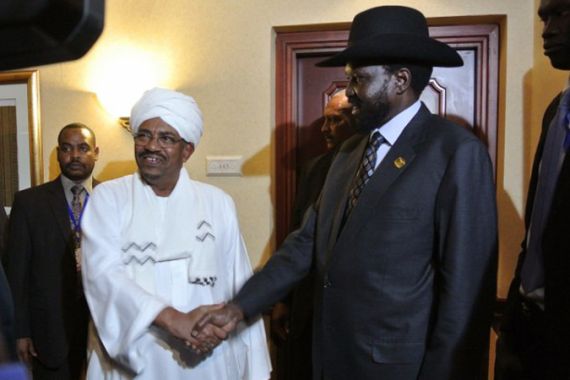Leaders of rival Sudans meet over disputes
President Omar al-Bashir and South Sudan counterpart Salva Kiir meet for first time since countries neared war in April.

African leaders have brought together the presidents of feuding neighbours Sudan and South Sudan for face to face talks at a hotel in the Ethiopian capital.
Saturday’s meeting, between President Omar al-Bashir and his South Sudan counterpart Salva Kiir, was the two leaders’ first close-up encounter since their countries came close to war in April and it raised hopes for a negotiated settlement of oil and border disputes before an August 2 UN Security Council deadline.
Their African peers had hailed their presence and pledges to pursue negotiations on ways to settle their disputes over border demarcation and sharing of oil revenues.
“Their statements persuaded us that there is good will,” Ivory Coast President Alassane Ouattara, who chairs the AU Council, told reporters after the closed-door session.
Landlocked South Sudan shut down oil production in January over a dispute with Khartoum about revenue sharing and fees for a pipeline through Sudan – the South’s only outlet for its oil exports. The two countries’ armies clashed in April over the disputed border oil area of Heglig.
The meeting took place on the sideline of the African heads of state meeting at AU headquarters in the Ethiopian capital to discuss ways to resolve messy aftermaths of military coups this year in Mali and Guinea-Bissau, which have put blots on the continent’s democratic credentials after advances in stability and governance in recent years.
Besides backing reconciliation between the Sudans, they also threw their weight behind regional efforts to end a military rebellion in east Democratic Republic of Congo that has strained ties between Kinshasa and its Great Lakes neighbour Rwanda.
Mali crisis
Focusing on Mali, where al-Qaeda-linked local and foreign fighters have seized control of the largely desert north after hijacking a rebellion by secular Tuareg separatists, the leaders said Africa would “spare no effort” to reunite the country.
They laid out a political and military strategy that aims to secure a full return of power to a civilian government in Mali’s south following a March 22 coup, and also foresees an internationally-backed security force whose mission will be to take back the north if the rebels there do not withdraw.
The AU Council “reiterates its call to all member states and all the international community for them to provide the necessary technical, logistical and financial support,” the continental body’s top security and peace official, Ramtane Lamamra, said in a statement to reporters.
African leaders are seeking UN Security Council support for military intervention in Mali to end the rebellion in the north and reunite the Sahel state. The Security Council has endorsed West African efforts to end the unrest but has stopped short of backing a military operation until African leaders can clearly spell out its objectives.
“For the moment, nothing is ready,” a European diplomat who follows the region closely said.
Ouattara said AU military experts were in Bamako discussing the military intervention strategy with the Malian armed forces. “This work is in progress,” he said.
Earlier, the Ivorian president condemned what he called “the intention of terrorist groups to create a sanctuary in northern Mali”. Denouncing alleged links between al-Qaeda in the Sahel region and other violent Islamist groups, such as Boko Haram in Nigeria and al-Shabaab in Somalia, Ouattara said this posed “a serious threat to regional security”.
Ouattara repeated the AU position that there would be no negotiations with “terrorist groups” in northern Mali.
AU leadership battle
One factor distracting the African heads of state from the continent’s serious security and development challenges is a bruising contest over who should head the AU Commission, which steers the regional diplomatic body.
The standoff, which has broadly split Africa’s French- and English-speaking blocs into two camps, pits South African Home Affairs Minister Nkosazana Dlamini-Zuma against incumbent Jean Ping from Gabon, and risks dominating the weekend summit.
The AU leadership race has been deadlocked since a January summit vote ended in stalemate between the candidacies.
With Ping carrying the broad support of Africa’s French-speaking states, and English-speaking states in southern Africa lining up behind Pretoria’s candidate, the continental body risks a division that could affect its global credibility and crisis-handling capacity if it persists, diplomats said.
As the debate over the leadership contest swirled in the corridors of the AU’s soaring Chinese-built steel and glass headquarters, rumours of compromise candidates to break the deadlock abounded.
Uganda’s state minister for foreign affairs, Henry Okello, said he was confident that the AU meeting could finally choose a new commission head, but he stressed “it should be a person that does not polarise”.